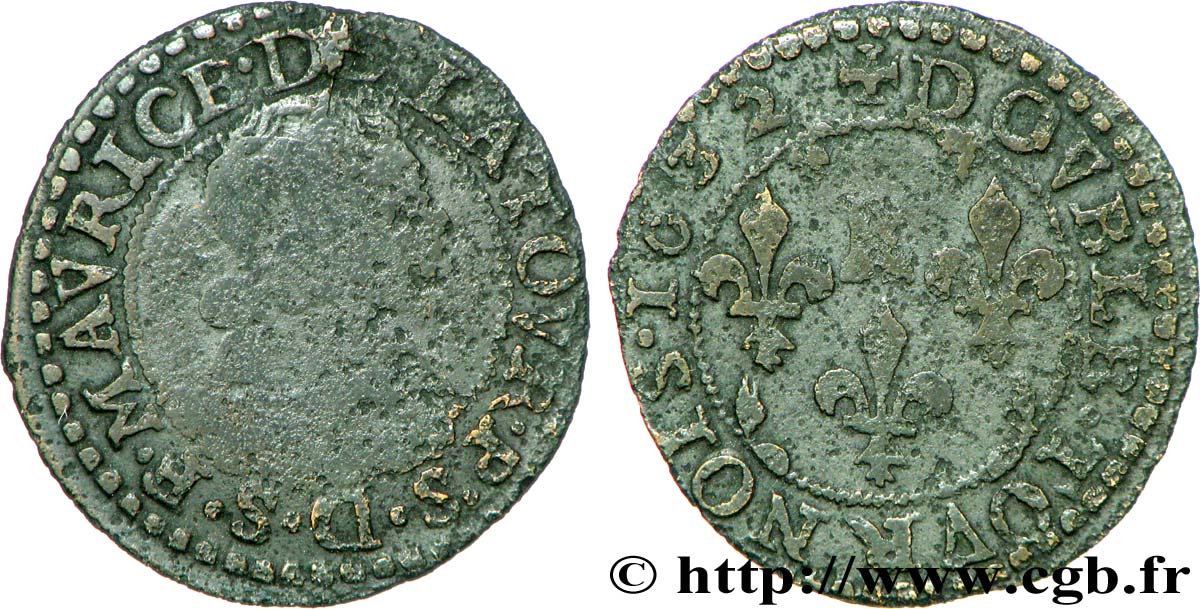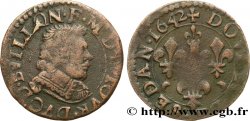正面
正面的文字 F. MAVRICE. DE. LA TOVR. P. S. D. S., (LÉGENDE COMMENÇANT À 7 HEURES).
正面的说明书 Buste de Frédéric-Maurice, tête nue à droite, drapé et cuirassé avec une grande collerette bordée de dentelle.
正面的翻译 (Frédéric-Maurice de la Tour, prince souverain de Sedan).
背面
背面的文字 + DOVBLE. TOVRNOIS. 1632.
背面的说明书 Petite tour fleurdelisée placée au milieu d'un champ semé de lis.
历史细节
ARDENNES - PRINCIPALITY OF SEDAN - FREDERIC-MAURICE DE LA TOUR D'AUVERGNE
(1623-1642)
Frédéric-Maurice de La Tour d'Auvergne is the son of Henri de La Tour d'Auvergne and Elisabeth de Nassau, the daughter of Guillaume le Taciturne (+1584) and the half-sister of Philippe-Guillaume, of Maurice and Frederick-Henry of Nassau. Frédéric-Maurice is also the brother of Henri de la Tour d'Auvergne (1611-1675), future Marshal of Turenne. He was born in Sedan in 1605. From the age of 17 he was Duke of Bouillon under the guardianship of his mother.. Frédéric-Maurice received a military education from his uncles Maurice and Frédéric-Henri, Stadtholder of Holland. Protestant, Frédéric-Maurice abjured and converted to Catholicism by marrying his cousin Éléonore de Berg. A fierce opponent of Richelieu, he maintained a correspondence with Gaston d'Orléans. He opposed the French monarchy and strengthened his ties with Spain. Like his father, he was a great conspirator. Richelieu had him arrested for having participated in the conspiracy of Cinq-Mars (beheaded in 1642) and he only obtained his freedom by renouncing the principalities of Sedan and Raucourt which were attached to the kingdom and occupied by French troops.. To save face, he obtained several small lordships scattered around the kingdom for the sum of six million pounds.. Frédéric-Maurice was initially assigned to residence in his Viscount of Turenne before taking refuge in Rome in 1645. He was appointed General of the Pontifical Troops. In 1647, Frédéric-Maurice returned to France where he was one of the main leaders of the Fronde, renewing his relations with the Spaniards. Frédéric-Maurice supported the King of France when the Court granted him as compensation, for his lands lost in 1642, the duchy of Château-Thierry, the counties of Auvergne and Évreux, as well as the title of "foreign prince "which placed him just before the dukes and peers of France and immediately after the princes of the blood. He died in August 1652 when he was to be appointed Superintendent of Finances.








 对产品描述纠错
对产品描述纠错 打印
打印 分享我的选择
分享我的选择 提问
提问 Consign / sell
Consign / sell
 产品介绍
产品介绍





